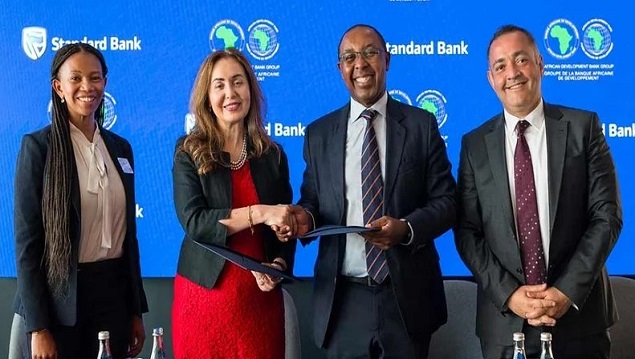E-Financial
AfDB, Standard Bank Unite to Support SMMEs and Boost Trade

The African Development Bank Group and Standard Bank Group (SBG) on Monday signed a landmark financial agreement to enhance funding for small, medium, and micro enterprises (SMMEs) and expand trade across Africa.

The agreement includes a R3.6 billion investment in a social bond and a $200 million Risk Participation Agreement (RPA) for Standard Bank of South Africa Limited (SBSA). This initiative strengthens Standard Bank’s lending capacity, ensuring greater access to finance for SMMEs, a critical driver of economic growth and job creation in South Africa.
The social bond investment promotes inclusive economic development, particularly for SMMEs with a turnover below R300 million and loan sizes under R40 million. This financing will support up to 4,000 businesses, helping them scale operations, create jobs, and contribute to economic resilience.
Kenny Fihla, Deputy Chief Executive Officer of Standard Bank Group and Chief Executive Officer of SBSA, welcomed the investment, stating: “This landmark partnership strengthens our ability to support SMMEs, the backbone of South Africa’s economy. With approximately 3.2 million SMMEs accounting for 60% of jobs, ensuring access to finance is crucial. This initiative aligns with our Sustainable Finance Framework and our commitment to financial inclusion.”
In addition to the social bond, the $200 million RPA enhances trade finance across Africa, focusing on Low-Income Countries and Transition States. This agreement enables local banks to increase lending by sharing risk, bridging the trade finance gap, and promoting intra-African trade.
Leila Mokaddem, Director General for Southern Africa at the African Development Bank, highlighted the broader impact: “This collaboration marks a significant milestone in our long-standing partnership and is a testament to our shared commitment to supporting SMMEs’ growth and enhancing trade finance across Africa.
“Expanding financial inclusion and trade opportunities empowers businesses to drive economic transformation and regional integration. The Standard Bank Group remains a strategic partner in our shared vision for economic development on the continent.”
This initiative aligns with the African Development Bank’s Ten-Year Strategy (2024–2033), which prioritises industrialisation, regional integration, and improving the quality of life in Africa. It also supports Standard Bank’s Sustainable Finance Framework, reinforcing both institutions’ commitment to fostering green and inclusive growth.
“We are proud of this transaction, demonstrating our shared commitment to sustainable financing. By supporting businesses, we create long-term economic opportunities and financial resilience,” stated Ahmed Attout, Director of the Financial Sector Development Department at the African Development Bank.
Kenny Fihla reaffirmed the significance of the collaboration: “By providing much-needed capital, we are helping enterprises overcome challenges and thrive. This partnership illustrates the power of collaboration in driving meaningful economic and social change in Africa.”
E-Financial
NGX Clears Fidelity Bank MD of Insider Trading Allegations

Nigerian Exchange Group (NGX) has affirmed that the recent purchase of 18 million units of Fidelity Bank shares by its Managing Director/Chief Executive Officer, Dr. Nneka Onyeali-Ikpe, was conducted in full compliance with applicable regulations.

In a letter dated May 22, 2025, the regulator dismissed allegations of insider trading and the misuse of bank funds for the transaction stating “….Following the filing of the Bank’s 2025 Q1 UFS on 30 April 2025, the Directors and other insiders of the Bank became eligible to trade on the securities of the Bank after twenty-four (24) hours.
“Therefore, the share purchase transaction referenced by Sahara Reporters which occurred on 19 May 2025 was transacted during an open trading window and NGX RegCo is not aware of any other price sensitive information that the Bank is required to disclose which should hinder trades on the securities of the Bank by insiders.”
Fidelity Bank has subsequently issued a statement addressing the accusations, categorizing them as false, misleading, and maliciously intended to tarnish the reputation of both the bank and its MD/CEO, as well as to mislead the investment community and the general public.
Signed by the bank’s Divisional Head of Brand and Communications, Dr Meksley Nwagboh, the statement clarified that Fidelity Bank was compelled to respond to the erroneous article published on May 21, 2025.
“As a publicly quoted company regulated by the NGX and subject to the Listing Rules of the NGX and the Securities and Exchange Commission (SEC) regulations, we unequivocally confirm that neither the Bank nor its MD/CEO has ever engaged in insider trading.”
Dr Nwagboh further emphasized that the MD/CEO personally funded the share purchase and did not utilize bank funds or take a loan for the transaction. The statement reaffirmed that the transaction was conducted in strict adherence to the Listing Rules and insider trading regulations governing publicly traded companies.
E-Financial
CBN Introduces AML to Fight Financial Terrorism, Gives Banks Deadline

Central Bank of Nigeria (CBN) has directed all financial institutions to implement real-time transaction alert systems as part of enhanced anti-money laundering (AML) compliance.

The directive was conveyed in a letter dated May 20, 2025, with reference number BSD/DIR/CON/AML/018/033, and titled “Exposure of Draft Baseline Standards for Automated Anti-Money Laundering (AML) Solutions – Request for Comments.”
The letter, signed by Olubukola Akinwunmi, director of banking supervision, was addressed to all financial institutions and outlines the regulatory expectations for modern AML compliance.
The apex bank emphasised that the initiative is part of its broader commitment to safeguarding the integrity and stability of Nigeria’s financial system, especially in the face of rapid digital transformation and the rise of innovative financial products.
The draft standards, which are now open to feedback from stakeholders, are designed to promote operational efficiency and ensure compliance with Anti-Money Laundering, Combating the Financing of Terrorism, and Counter-Proliferation Financing (AML/CFT/CPF) regulations.
“This standard is informed by a comprehensive assessment of existing solutions within the industry and aligns with global best practices, including recommendations by the Financial Action Task Force (FATF),” the document stated.
According to the CBN, the draft baseline standards are developed with key objectives in mind.
These include strengthening the AML capabilities of financial institutions through advanced, technology-driven solutions; encouraging the adoption of emerging technologies for real-time detection and reporting of suspicious transactions; reducing the inefficiencies associated with manual compliance processes; and ensuring alignment with evolving regulatory expectations both locally and internationally.
The draft document is available for download on the official website of the Central Bank of Nigeria, and all stakeholders have been encouraged to review and provide feedback.
“We look forward to receiving your valuable feedback,” the letter noted, highlighting the collaborative approach to shaping the final version of the standards.
Among the critical requirements outlined in the draft are real-time alerts for transactions considered high risk.
These include cross-border transactions, excessive cash deposits, cryptocurrency-related dealings, and other activities flagged under existing AML regulations.
The document specifies that the time taken to review and act on such alerts must not exceed a predetermined timeline, reinforcing the need for swift response and decision-making.
The CBN mandates that financial institutions implement transaction monitoring systems capable of supporting multiple risk scenarios.
These systems should use configurable filtration rules and customer segmentation techniques to effectively detect suspicious behavior. Institutions are also required to conduct regular stress testing and system validation exercises to minimise false positives.
“Each institution must define a predetermined threshold for false positives and ensure that the rate remains below this threshold,” the document stated, underlining the importance of maintaining a balance between alert sensitivity and accuracy.
The draft also mandates that AML solutions incorporate artificial intelligence and machine learning (AI/ML) capabilities.
These technologies should support anomaly detection, behavioral pattern recognition, automated risk scoring, and adaptive learning based on insights from previously flagged alerts and their resolutions.
The aim is to ensure that the systems not only detect suspicious activity but also evolve over time to become more efficient and accurate.
Real-time access to Customer Due Diligence (CDD), Know Your Customer (KYC), and Know Your Customer’s Business (KYB) data is another essential feature prescribed in the draft standards.
Financial institutions are expected to automate customer onboarding processes with real-time identification and verification in line with existing AML/CFT/CPF regulations.
This includes integration with Bank Verification Number (BVN) and National Identification Number (NIN) databases to ensure instant verification.
Moreover, the draft outlines the need for comprehensive KYC and KYB functionalities.
These must include automated customer risk profiling, transaction behaviour analysis, historical data tracking, and the inclusion of various risk factors derived from money laundering, terrorist financing, and proliferation financing risk assessments and typologies.
The solutions must also enable continuous classification of customers into risk categories to facilitate more targeted and effective risk management.
The Central Bank’s move to expose the draft for industry-wide input reflects its intention to build a robust, technologically advanced AML compliance culture across Nigerian financial institutions.
It signals a significant step towards enhancing transparency, operational efficiency, and international alignment in Nigeria’s financial regulatory environment.
E-Financial
Peter Obi Denies Secret Meeting with Tinubu over Fidelity Bank

Peter Obi, presidential candidate of Labour Party for 2023 elections, has publicly dismissed recent allegations linking him to a secret meeting with President Bola Tinubu over a fabricated debt scandal involving Fidelity Bank, describing the claims as “baseless, malicious, and entirely false.”

Peter Obi and Bola Tinubu
In a statement posted on his official X handle on Thursday, Obi expressed deep concern over what he called a growing business of blackmail targeting his public image.
“It’s obvious that the biggest business for blackmailers now is talking about Peter Obi from every negative perspective,” he wrote, adding that even his “solemn spiritual trip to Rome” had been twisted into a “blackmail campaign.”
Obi addressed a viral claim suggesting he travelled to Rome for a private meeting with President Tinubu in connection with a purported ₦225 billion debt crisis involving Fidelity Bank.
He categorically denied the allegation, clarifying the nature of his brief interaction with the President.
“I have never sought an audience with, nor met, President Tinubu since he assumed office,” Obi stated.
“Except (for a) one-minute meeting at the arena of Saint Peter’s Basilica, Rome during the inauguration Mass of Pope Leo XIV, where I was seated behind, and had to respectfully greet him and other dignitaries present.”
According to Obi, he was in Rome on May 9 for the lying-in state of Pope Francis and departed for London immediately after the Mass before returning to Nigeria.
The former Anambra State governor also refuted renewed claims that he owns Fidelity Bank.
He acknowledged his previous role as Chairman and Director of the bank, but emphasised that he does not own it.
“Fidelity has over 500,000 shareholders, none of whom hold a majority stake,” Obi explained.
“What this blackmailer seeks is to harm these hardworking Nigerians and cause them needless distress.”
He described the individual behind the allegations as a “self-proclaimed blackmailer-in-chief” and criticised the ongoing efforts to tarnish his reputation for political or financial gain.
Obi offered a prayer for those responsible for spreading falsehoods against him: “May God grant you the virtues of gratitude and understanding to know that we came here with nothing and will go with nothing, (and) that they cannot profit from their evil ways.”

 E-Financial3 days ago
E-Financial3 days agoCBN Introduces AML to Fight Financial Terrorism, Gives Banks Deadline

 Telecom3 days ago
Telecom3 days agoCelebrating African Creativity: Made by Africa, Loved by the World’ Returns for Its Fifth Year

 Broadcasting3 days ago
Broadcasting3 days agoLuft Pay TV Launches in Lagos, Promises to Revolutionize Entertainment

 General News3 days ago
General News3 days agoOver 250,000 Cyberattacks Disguised as Anime – Report

 E-Financial3 days ago
E-Financial3 days agoPeter Obi Denies Secret Meeting with Tinubu over Fidelity Bank

 E-Financial3 days ago
E-Financial3 days agoPremiumTrust Bank Reassures Customers of Continued Security after Cyberattack Foil

 E-Financial3 days ago
E-Financial3 days agoFidelity Bank’s N10.5tr assets base reinforces stakeholders’ confidence -Insiders bid for more equity stakes

 E-Business3 days ago
E-Business3 days agoINEC Sets Up AI Division to Strengthen Electoral System













